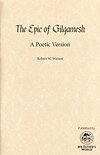Robert W. Watson
Auteur de The Epic of Gilgamesh: A Poetic Version
A propos de l'auteur
Crédit image: Taken by Kevin Hurdelbrink
Œuvres de Robert W. Watson
Studies in Poetry 2 exemplaires
A Guide to Constructive Grammar 1 exemplaire
The Book of Job; A Literary Study from the AV 1 exemplaire
A Student's Companion to A Tale of Two Cities 1 exemplaire
A Student's Companion to The Pilgrim's Progress 1 exemplaire
An Introduction To The Short Story 1 exemplaire
Moping Melancholy Mad 1 exemplaire
Étiqueté
Partage des connaissances
- Nom légal
- Robert William Watson, Jr.
- Date de naissance
- 1951-04-11
- Sexe
- male
- Lieux de résidence
- Fraser, Michigan, USA
Olmsted Falls, Ohio, USA
Macon, Georgia, USA
Tulsa, Oklahoma, USA - Études
- Bob Jones University, Greenville, South Carolina, USA
Walter F. George School of Law, Mercer University, Macon, Georgia, USA
University of Georgia, Athens, Georgia, USA
Membres
Critiques
Vous aimerez peut-être aussi
Auteurs associés
Statistiques
- Œuvres
- 12
- Membres
- 51
- Popularité
- #311,767
- Évaluation
- 3.9
- Critiques
- 9
- ISBN
- 12



 Cette critique a été écrite dans le cadre des Critiques en avant-première de LibraryThing.
Cette critique a été écrite dans le cadre des Critiques en avant-première de LibraryThing.

